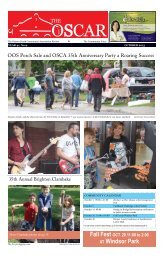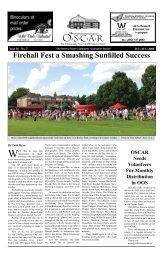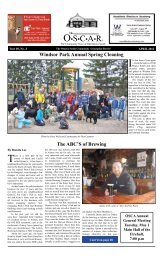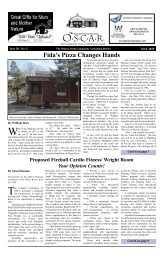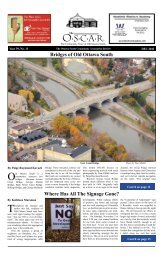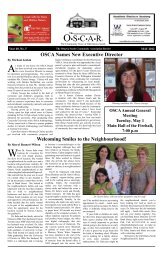O•S•C•A•R© Shop Your Local! - Old Ottawa South
O•S•C•A•R© Shop Your Local! - Old Ottawa South
O•S•C•A•R© Shop Your Local! - Old Ottawa South
Create successful ePaper yourself
Turn your PDF publications into a flip-book with our unique Google optimized e-Paper software.
The OSCAR - OUR 36 th YEAR<br />
Page 34 DEC 2008<br />
By Susan McMaster<br />
Because it makes great Christmas<br />
gifts. A poem nicely printed<br />
on good paper, makes a cheap,<br />
unusual gift. (See, poetry is practical!)<br />
I do one every year. Friends have kept<br />
some of my Christmas poems pinned to<br />
their bulletin boards for years, and I’ve<br />
myself propped poem cards on my study<br />
mantelpiece or shelves for even longer.<br />
The fifth reason poetry matters is<br />
because, although every life is a story,<br />
you can’t remember exactly how it<br />
started, and you won’t know exactly how<br />
it ends. It won’t be you who completes<br />
the narrative. What you do have are the<br />
moments in between – holding a baby for<br />
the first time, saying goodbye to a friend<br />
for the last, waking to a fall of new snow.<br />
Moments like these, caught in a handful<br />
of luminous words, will be available to<br />
you always, in every deeply felt detail.<br />
The fourth reason poetry matters<br />
is because it is beautiful. At times of<br />
ceremony or deep emotion, we need<br />
extraordinary words: “To the marriage of<br />
true minds...,” “Rage, rage, against the<br />
dying of the light...,” “Ashes to ashes,<br />
dust to dust....”<br />
The third reason is that it intensifies<br />
other arts. How often have you heard a<br />
great new song – wonderful beat, great<br />
voice – only to realize the words were flat<br />
and banal? Or the opposite? Even simple<br />
lyrics can be memorable and satisfying:<br />
“I once had a girl, / or should I say, / she<br />
once had me. / She showed me her room, /<br />
isn’t it good, Norwegian wood?” The joke<br />
Why Does Poetry Matter?<br />
and intrigue of “had” and “had”; the halfrhyme<br />
of “room” with the full rhymes of<br />
“good”, “wood”, and “should”; the mystery<br />
of “Norwegian wood” and its suggestion<br />
of cold northern light, hearthfire, a pale<br />
Nordic beauty; the perfect match between<br />
melody and words: this is poetry.<br />
As is, of course, “To be or not to be...,”<br />
from the greatest theatre in our language.<br />
Poetry appears in theatre worldwide across<br />
all recorded time. A minor contribution of<br />
my own is “Dangerous Graces”, a show<br />
of women’s poetry which I scripted for<br />
the GCTC. Artists of all kinds take off<br />
from poetry – composers, visual artists,<br />
choreographers, film producers. Many<br />
of my poems have been set to music, for<br />
example, as in a recent cantata by John<br />
Armstrong and the performances and<br />
recordings of Geode Music & Poetry and<br />
First Draft. They’ve also inspired artworks<br />
by such painters as Roberta Huebener and<br />
Juliana McDonald.<br />
The second reason poetry matters is<br />
that it pays attention. To the moment, to the<br />
details, which convey the whole so much<br />
more effectively than generalizations.<br />
“A lovely fall day,” one might say, or,<br />
instead, “Season of mists and mellow<br />
fruitfulness...” “Death is awful,” or “I<br />
heard a fly buzz when I died...” “How can<br />
I choose?” or, “ Two roads converged in a<br />
yellow wood...” “I love you,” or “How do<br />
I love thee, let me count the ways...”<br />
The first reason why poetry matters – well,<br />
I leave that to you. Is there a poem you<br />
love?<br />
Susan McMaster with a cup of tea at her home.<br />
Photo by M A Thompson<br />
Lend Me <strong>Your</strong> Left Ear<br />
By Mary Anne Thompson<br />
The Gargoyle’s Left Ear: Writing<br />
in <strong>Ottawa</strong><br />
By Susan McMaster<br />
Black Moss Press Settlements, 2007<br />
ISBN 978-0-88753-443-0<br />
Part memoir, part portrait of the<br />
artist in <strong>Ottawa</strong>, and part activist<br />
manual, The Gargoyle’s Left<br />
Ear is Susan McMaster’s recently<br />
published poetic prose song.<br />
Susan weaves her life as shy<br />
child, young emerging feminist, wife,<br />
mother, and artist against the familiar<br />
backdrop of the streets of OOS, the<br />
Glebe, Carleton and Lisgar.<br />
Her connections to the people<br />
in the artistic community of poets,<br />
visual artists and musicians reads<br />
like a Who’s Who of Artistic <strong>Ottawa</strong>:<br />
Ouroboros (which published her first<br />
collection); the <strong>Ottawa</strong> Poetry Group;<br />
<strong>Ottawa</strong> Independent Writers; First<br />
Draft; SugarBeat; and Geode Music &<br />
Poetry; the stages where she presents<br />
her work, like the National Library,<br />
National Gallery, Great Canadian<br />
Theatre Company, Rasputin’s, Tree,<br />
Orion, the <strong>Ottawa</strong> International<br />
Writers’ Festival, <strong>Ottawa</strong> Folk<br />
Festival, CBC, CKCU, CHUO, and<br />
CHEZ.<br />
Throughout the book, Susan<br />
makes clear that poetry is not written<br />
in a vacuum. Balances between<br />
www.freecycle.org<br />
Changing the world<br />
free & open to all<br />
24 hours a day, 365 days a year<br />
family and poetry are not often easy,<br />
and Susan shows with insightful<br />
humour and compassion how she<br />
has managed. There is drama; falling<br />
through the canal into icy water when<br />
she was late in pregnancy; and not<br />
knowing if a child is going to live or<br />
die. There is humour: misplacing the<br />
text of the poem she wrote to read at<br />
her oldest daughter’s wedding.<br />
Through such projects as<br />
Bookware, <strong>Ottawa</strong> Valley Poets,<br />
Waging Peace: Poetry and Political<br />
Action, “Random Acts of Poetry,”<br />
“Against the War …,” and “Poetry in<br />
the Park,” Susan has helped to make<br />
poetry relevant to our understanding<br />
of the world and our place in it. At<br />
this time of economic uncertainty and<br />
concern for war and environmental<br />
devastation, we need poetry and poets<br />
more than ever.<br />
The Gargoyle’s Left Ear<br />
illustrates over and over again how<br />
poetry can say what might not be<br />
said. Poetry gives voice to the best<br />
and worst and saddest and happiest<br />
times. To birth and death. By tracing<br />
the thread of poetry through her life,<br />
Susan shows that poetry encompasses<br />
who we are -- the good, the bad and<br />
the ugly – and helps us to realize that<br />
as humans we are flawed but beautiful.<br />
That life itself is beautiful and worth<br />
living to the full.<br />
Many of the artists Susan writes<br />
about in The Gargoyle’s Left Ear<br />
have links to OOS. Mary Lee Bragg<br />
and Colin Merton have both written<br />
for the December OSCAR. (see pages<br />
19 and 22 in this issue). Susan herself<br />
was mid-wife at the birth of OSCAR,<br />
helping Nancy Ross start this<br />
community newspaper in <strong>Old</strong> <strong>Ottawa</strong><br />
<strong>South</strong> more than 35 years ago.<br />
Although I grew up in <strong>Ottawa</strong>,<br />
in reading her work I learned many<br />
interesting things about the nooks and<br />
crannies of this city.



